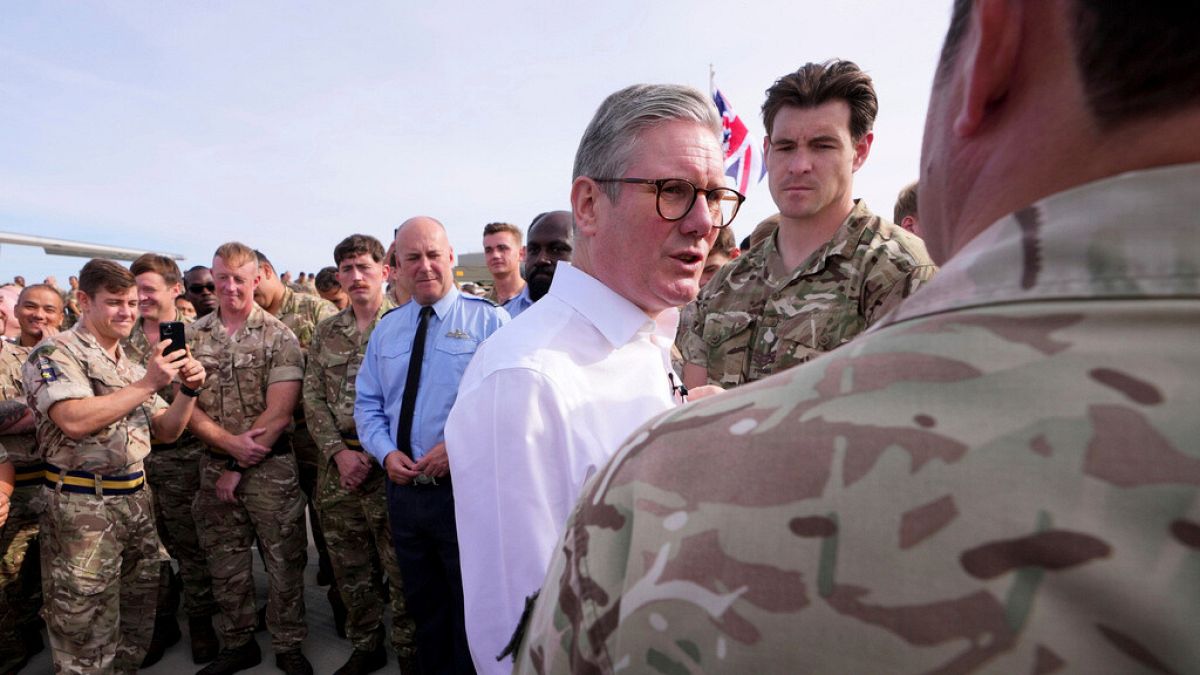Starmer’s comments are the first time the leader has publicly and explicitly said he would be willing to send peacekeeping troops to Ukraine.
UK Prime Minister Keir Starmer said on Sunday he would be prepared to send British troops to Ukraine if Moscow agreed to a deal requiring the presence of European peacekeepers.
This marks the first time the British leader has explicitly said he would be willing to deploy the UK army to Ukraine and comes right before an emergency meeting of European leaders in Paris.
Starmer is set to attend the meeting, an EU source close to the matter told Euronews.
In an op-ed for the Daily Telegraph, Starmer acknowledged that sending peacekeeping troops to Ukraine risked “putting them in harm’s way” but that the crisis was an “existential” question for Europe and a “once in a generation moment.”
He also said that the UK was willing to lead in Ukraine’s defence and security, including committing £3 billion (€3.6bn) annually until 2030.
His comments come after a whirlwind week of speeches by officials in the new Trump administration, during which they suggested the US would wind down its defence commitments in Europe and push forward peace talks in Ukraine without the involvement of European leaders.
US President Donald Trump’s special envoy on Ukraine and Russia, Keith Kellogg, said on Saturday that it was unlikely Europe would have a seat at the negotiating table in peace talks between Russia and Ukraine.
However, he did say that a “European alliance” would be “critical” to ensuring Ukrainian sovereignty.
Last week, Trump and US Secretary of Defence Pete Hegseth both implied they were not closely concerned with the return of Russian-occupied territories to Kyiv or Ukraine’s long-held NATO aspirations — both key to Ukrainian President Volodymyr Zelenskyy’s proposed peace deal.
Representatives of the US administration and their Russian counterparts are expected to meet in Saudi Arabia this week for talks. This follows a phone conversation between Trump and his Russian counterpart Vladimir Putin that upended a three-year-long US-led effort to isolate the Russian leader.
Their comments have left European leaders scrambling to understand how the continent could contribute to a peace process.
The concept of sending European peacekeeping troops to Ukraine in the event of a peace deal is not new. It was first proposed by French President Emmanuel Macron, who refused to rule out putting French troops on the ground in Ukraine in early 2024.
Since then, the plan has quietly gained traction, although details on what such a force might look like and who would take part are scarce.
The size, makeup, and role of a potential European peacekeeping force would also be determined by the kind of peace deal reached, the size of the frontline, and the number of Ukrainian and Russian forces on either side.
In his op-ed, Starmer echoed calls by US and EU officials over the weekend that European nations must “increase defence spending” and take on a “greater role” in the NATO military alliance.
As of early 2024, eight of NATO’s 30 European members have not met the target of spending 2% of their GDP on defence.
The UK currently spends around 2.3% of its GDP on defence and has committed to increasing defence spending to 2.5% of the economy — although Starmer’s Labour government has not given a timeframe for this.
Following world leaders meeting at the Munich Security Conference over the weekend, European Commission President Ursula von der Leyen announced she would propose activating an escape clause in the bloc’s fiscal rules for defence spending.
The measure would allow several EU member states to boost their defence spending without being bound by tightly controlled budget deficit limits.
Starmer will be joined in Paris on Monday by leaders from Germany, Italy, Poland, Spain, the Netherlands and Denmark, as well as von der Leyen and NATO chief Mark Rutte.

